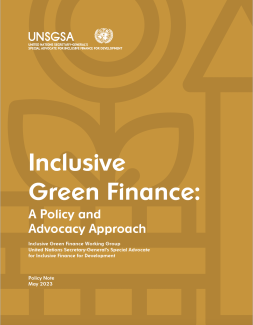
A new report examines how access and usage of financial services can help build resilience in the face of climate shocks, while also providing opportunities to participate in green economic sectors. Titled, Inclusive Green Finance: A Policy and Advocacy Approach, it aims to highlight the interdependent and amplifying role of financial inclusion in global sustainability efforts and strengthen climate considerations in financial inclusion plans and strategies. It also presents examples and opportunities for advocacy on inclusive green finance (IGF).
The report was launched by the Inclusive Green Finance Working Group (IGFWG), convened by H.M. Queen Máxima of the Netherlands, the United Nations Secretary-General’s Special Advocate for Inclusive Finance for Development (UNSGSA).
The working group also released a two-page summary report.
As highlighted in the report, IGF is a way for people to have access to financial services and products that help them prepare for and recover from the negative effects of climate change. It also helps low-income households, small businesses, and vulnerable groups participate in the green and low-carbon economy.
Lower-income households are disproportionately affected by climate change. For example, these households often have fewer financial options to address and cope with its impacts, including floods, fires, and crop failures. Further, these households are more likely to be in areas that are vulnerable to climate change.
According to the World Bank Global Findex (2021), out of 1.4 billion unbanked adults globally, over 1 billion live in the most climate-vulnerable countries. In these countries, 73% of adults either do not have a bank account or are not financially resilient, compared to one of three in countries that are less vulnerable to climate change.
The report explains how policymakers and regulators can scale IGF to support resilience and adaptation outcomes for underserved segments through financial inclusion in the face of rising climate shocks. Policies include integrating IGF at the country level, such as addressing climate change in National Financial Inclusion Strategies (NFIS). It also includes investing in information, data, and tools to develop and scale use cases for IGF.
The report also discusses how to introduce IGF in financial sector regulatory approaches, including at the global level with standard-setting bodies (SSBs).
ABOUT THE INCLUSIVE GREEN FINANCE WORKING GROUP (IGFWG)
The Inclusive Green Finance Working Group (IGFWG) was convened in May 2022 by H.M. Queen Máxima of the Netherlands, the United Nations Secretary-General’s Special Advocate for Inclusive Finance for Development (UNSGSA). The group is composed of senior IGF experts from the Alliance for Financial Inclusion (AFI), the Center for Financial Inclusion (CFI), and the Sustainable Banking and Finance Network (SBFN), as well as independent technical experts and staff members from the Office of the UNSGSA.